There's an abundant reserve of potash deep underneath portions of Michigan's Lower Peninsula, worth $65 billion to Michigan's economy, according to the man who wants to mine the mineral, a nearly essential agricultural fertilizer.

"This is a transformative, generational opportunity for Osceola County," said Theodore Pagano, CEO of Michigan Potash Operating LLC.
"One of the world's tightest-controlled commodities sits in Evart Township, and it's the highest-graded ore by a factor of two. And it sits in a location better than anybody else's in the world."
But Pagano told the Free Press that in March 2018. One and three-quarters years later, that potash remains in the ground. Michigan Potash has yet to start operating a mine on its property in Evart Township, about 5 miles southwest of the city of Evart.
A grassroots environmental group, Michigan Citizens for Water Conservation, based in Mecosta, filed a legal challenge to permits issued for the mine by the Michigan Department of Environmental Quality, now known as the Michigan Department of Environment, Great Lakes and Energy.
"They could not have picked a worse location," said Ken Ford, an Osceola County planning commissioner and board member with the Michigan Citizens group.

"It's in the middle of four streams. It's 200 yards from the largest freshwater marsh in Osceola County."
Michigan Potash proposes to use solution mining — wells not unlike typical oil and gas fracking wells, but that would inject brine water thousands of feet underground to dissolve potash, bring it to the surface, and then dry and reconstitute it. The operation would also generate marketable, table-grade salt. Brine water waste would be disposed of deep underground via disposal wells.
The company intends to mine about 1 million tons of potash per year from the Evart Township facility. Known potash reserves in the area could sustain that amount of annual extraction for 150 years, before even further exploring the area for potentially more, Pagano said.
EGLE — then the DEQ — last year approved permits for eight brine production wells and three disposal wells for the potash mine, over the protests of some local residents and environmental groups. The U.S. Environmental Protection Agency also approved permits for the solution mining and disposal wells in 2017.
EGLE approval would allow Michigan Potash to extract 725 million gallons of groundwater annually, almost 2 million gallons per day — more than five times the controversial groundwater withdrawal by Nestlé North America's Ice Mountain bottled water operation only a few miles away.
"You're looking at these guys drawing (more than 1,300) gallons per minute of fresh, clean water," Ford said. "Then injecting toxic brines at a rate of 2,000 pounds per square inch back into the ground."
With old, historical mining operations in the area, the high-pressure injection wastes could find paths back to the surface, Ford said.
"It's an accident waiting to happen," he said.
Citizens for Water Conservation challenged the state permits before an administrative law judge. In September, Administrative Law Judge Daniel Pulter dismissed the case, saying he didn't have jurisdiction and that the Citizens group should have sought a hearing with EGLE's Supervisor of Wells prior to the state's issuance of permits.
The Citizens group's appeal of the potash operation's permits has since moved to EGLE's Environmental Permit Review Commission, a controversial body created by state law last year under then-Gov. Rick Snyder. The 15-member panel, consisting of governor appointees from utilities, oil and gas and other industries, can advise the EGLE director on disputes related to permit applications and contested cases related to a permit decision.
At a Nov. 1 hearing before the panel, both Michigan Potash and the Citizens group were asked to provide briefs on the mine issues prior to the panel's next meeting, March 20.
In an email to the Free Press, Pagano pushed back on Citizens group assertions that a market glut of potash means economics are working against Michigan Potash's proposed mine, which will cost more than $700 million.
"The United States remains 96% import-reliant and held captive by foreign inventories for the indefinite future, unless Michigan services that need," he said, adding, "This is a 100-year project that is necessitated by long-term food security; not short-term seasonal variations."
Pagano also disputes environmentalist concerns that the project might foul groundwater or surface water, saying historic potash mining nearby operated from 1980 to 2013 "without incident to surrounding wetlands for over 30 years." The Michigan Potash approach is more modern and even less impactful on the environment, he added.
Citizens group members hope the review panel this spring will reverse the permit approvals for the mine. Group member Doug Miller lives next to a marsh that could be impacted by the mining.
"By permitting these very expensive wells, (EGLE) has, in essence, permitted the entire project, all without requiring the company to do any environmental testing or studies," he said.
Contact Keith Matheny: 313-222-5021 or kmatheny@freepress.com. Follow on Twitter @keithmatheny.
https://www.freep.com/story/news/local/michigan/2019/12/30/mining-companys-michigan-potash-dreams-remain-limbo-two-years-later/2677314001/
2019-12-30 12:01:00Z
CAIiEKmC2UU5LeSKR2eTPevoAh0qGQgEKhAIACoHCAowlv3_CjDSpYsDMPf14gU
Bagikan Berita Ini














0 Response to "What's happening with that supposed gold mine of potash beneath Michigan? - Detroit Free Press"
Post a Comment